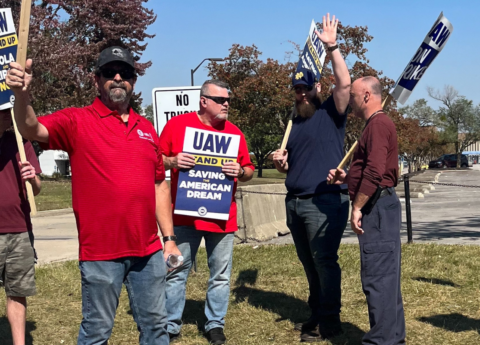Dear Governor Beshear,
Thank you for your efforts and decisions to protect Kentuckians from economic hardship during the COVID-19 pandemic. We are writing as a coalition of organizations representing Kentucky workers, families and communities to urge your continued commitment to fully providing expanded pandemic unemployment benefits through the duration of that federally-funded program in early September.
The economy fell in a deep hole during the pandemic, and though progress is beginning to be seen we still have far fewer jobs than before the crisis began. And while we applaud your tremendous progress in getting Kentuckians vaccinated as quickly as possible, we are still at a point where just 37% of the state’s residents are fully vaccinated. Now is not the time to take away the vital lifeline of the extra $300 a week in federally-funded jobless benefits known as Federal Pandemic Unemployment Compensation (FPUC).
FPUC is providing a necessary bridge for families and the economy as we begin to emerge from the COVID-19 economic crisis. Many of the Kentuckians still receiving unemployment benefits were recently laid off or are immunocompromised, recovering from long-COVID, looking for a job in fields where opportunities are still scarce and shouldering child and elder care responsibilities.
FPUC has added an average of $19 million a week in federal dollars into Kentucky’s fragile economy, spurring business growth as people spend those dollars in communities and shoring up family budgets during a time of continued severe hardship. Claims it is a major barrier to hiring workers are not based in evidence. Eliminating FPUC would hamper our recovery and hurt ailing workers.
Extra federal money helps spur demand and boost jobs
Since FPUC was reinstated by the relief package passed by congress in December, it has brought an estimated $328 million into Kentucky. This money was then used by claimants to pay for their everyday needs like groceries, utilities and transportation — spending that in turn supports businesses and jobs as it flows through the economy.
Eliminating the $300 a week in benefits early as some states are now doing would cost Kentucky an estimated $229 million and hurt our economy as people would necessarily buy fewer goods and services. Last summer, when Congress allowed the larger $600 version of FPUC to expire, the Economic Policy Institute estimated that that loss in demand could have cost Kentucky nearly 50,000 jobs. Additionally, because FPUC is a federally-funded benefit, all of this money comes from out-of-state and costs Kentucky businesses and Kentucky state government nothing.
Kentuckians are giving up jobless benefits and going back to work
Some are falsely claiming that the extra $300 in benefits is keeping people from working, but in fact Kentuckians are returning to work in huge numbers. Over the last year the number of Kentuckians receiving unemployment benefits has fallen dramatically while the number of people employed has been rising. Nearly 200,000 net jobs have been filled since the worst point in the crisis last April, and the number of Kentuckians receiving unemployment benefits is now just 18% of what it was at that time.
Those making these claims cannot point to evidence to support them. Careful academic research on the much bigger $600 benefit last year found it had little to no impact on employment.
Most of the complaints about an alleged labor shortage come from restaurants offering low wages, few benefits and little workplace flexibility. Even with the limited appeal of restaurant work people are returning to those jobs in huge numbers: 40,600 more Kentuckians work at restaurants now than at the worst point in the COVID recession. That sector faces two remaining barriers. It shed nearly 40% of its employment during the crisis, and it will necessarily take time to build back its workforce even as customers return to restaurants after being vaccinated and as COVID cases fall. And some restaurants insist on continuing to offer low wages at a time when workers still face barriers to employment including care responsibilities and health problems. To attract workers, those businesses can offer competitive compensation and more accommodations.
Cutting off FPUC would hurt a wide range of workers who are receiving a benefit they need at a time when the economy is still struggling. Only 10% of Kentucky workers receiving state unemployment benefits in March had previously worked in the accommodation and food services sector, which is generating most of the attention. In fact, the two industries with the most workers still receiving jobless benefits are manufacturing and construction. Along with these side-lined workers, over 14,000 self-employed workers and business owners are receiving Pandemic Unemployment Assistance (PUA) and the extra $300 in FPUC and would be harmed by prematurely ending Kentucky’s participation.
Cutting off the $300 in supplemental benefits would also widen existing inequities and put up new roadblocks for Kentuckians already facing disproportionate harms from the pandemic. Black Kentuckians, for example, make up 13.1% of laid-off Kentuckians currently receiving unemployment benefits, a larger share than their 9.8% of the workforce.
Kentucky should continue to administer the federal benefit as long as it is available
Last summer when the $600 per week version of FPUC expired, we heard from many Kentuckians about how their hardship was exacerbated without that income support. Parents of young children, Kentuckians caring for ailing partners and elders and many others did not know how they would buy needed medication, keep the lights on, and pay their mortgage or rent.
While COVID-19 cases are falling and more Kentuckians are getting vaccinated, the pandemic isn’t over yet and the economy has a long way to go until it is back to pre-pandemic conditions. Kentucky still has 98,100 fewer jobs than before COVID-19 hit, and nearly 1 in 3 Kentucky adults report difficulty covering usual household expenses.
While the economy is getting back on its feet, we ask you to protect this critical support to families and boost to our recovering economy.
Thank you for your consideration.
Sincerely,
Advocacy Action Network
Ashland Area Labor Council
Forward Kentucky
Greater Louisville Central Labor Council
Homeless and Housing Coalition of Kentucky
IATSE Local 17 Stagehands
Jefferson County Teachers Association
Kentucky Center for Economic Policy
Kentucky Coalition Against Domestic Violence
Kentucky Council of Churches
Kentucky Equal Justice Center
Kentucky State AFL-CIO
Kentucky Voices for Health
International Brotherhood of Electrical Workers Local 212
National Association of Social Workers – Kentucky Chapter
United Auto Workers
United Mine Workers of America
United Food and Commercial Workers Local 227




